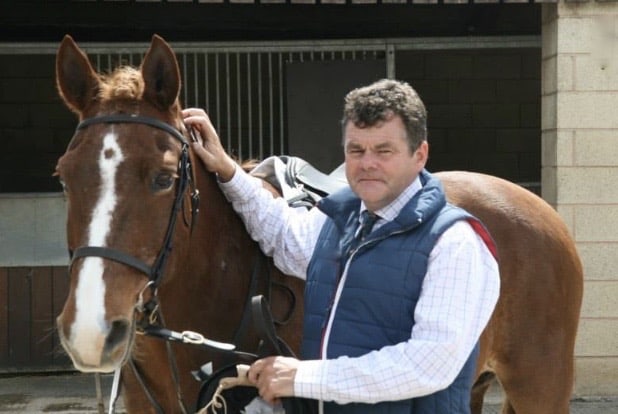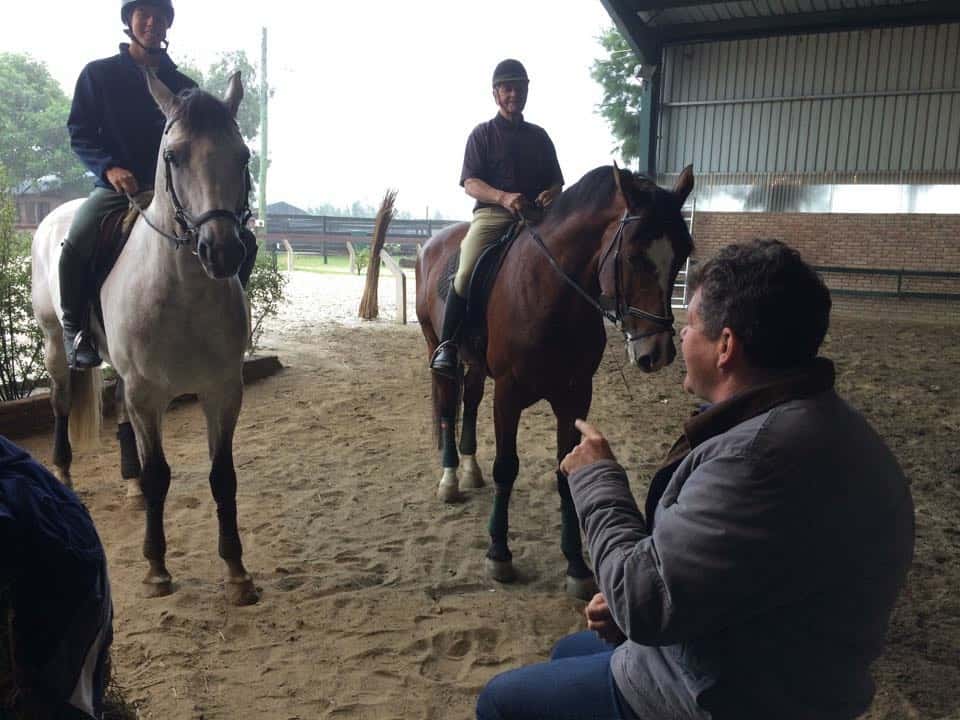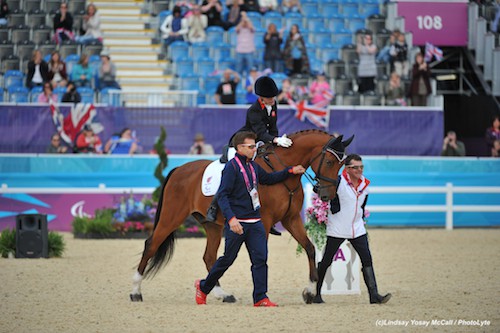Irish Sport Horse Magazine’s Jessica Soley caught up with International Paralympic Dressage Coach Clive Milkins, to discover what is involved when training and helping athletes achieve medals at this level.

Clive can you tell me how you got into working with horses?
I come from a non horsey background, my father was an administrator for Bristol University, and my mother was proud to be called a house wife.
Dad and I watched a local football team, and when I was 16 Bristol City got relegated to the second division and I just said “ Can I learn to ride a horse please?” After that there was no going back. I rode with Bristol university students in a class lesson as a beginner, and became a stable brat, scrounging rides at weekends at Hunstrete Riding School.
I walked away from school and became an old fashioned working pupil 6 days a week for £30 a week. Passed my BHSAI and then got a job with Rodney Powell as an eventing groom before I ended up at Warwickshire College.
What are you currently doing and how did your career path lead you to your present roll?
At the moment, I am Technical leader for the Canadian Paralympic Team. I am their Team coach and advisor on all things para from grass roots coming out, from therapy right up to hopefully, paralympic podium success.
I also work for FEI solidarity, advising developing Nations like Uruguay and Guatamala on how to create athlete pathways. In my free time I coach at various RDA and therapy centres throughout Canada, USA and Europe including Omagh RDA.
I haven’t really had that many jobs in my life if I’m honest, after studying at College, I stayed on as a member of their staff for four years, and then I went to South Bucks RDA centre in order to prepare an athlete for the 1994 World Championships at Hartbury.
I was only meant to stay for 12 months and ended up being there for over 20 years. Di Redfern is a major influence and mentor in my life. She and Jane Goldsmith FBHS mentored, advised, coached and supported me through many trials and tribulations.
We created the first ever structured para-programme with great facilities and school master horses. Many of Team GB’s athletes have trained at South Bucks including Natasha Baker and Sophie Christiansen. Both arrived as teenagers riding for therapy and went on from there. I trained Sophie from 2000 until 2014 when she was Triple Paralympic, Triple European and double World Champion.
What lead you to coaching and how long have you been involved with coaching Para riders?
I was always more interested in coaching than riding if I’m honest. I did a lot of different things as a rider and carriage driver, including some time as an extra for film work. The coaching and mentoring was always who I am – I guess it’s about putting something back into a sport that has given me so much.

I started with Para in 1987 back in my College days at Moreton Morrell. This year I’m celebrating my 32nd year in the sport! Jane Goldsmith thought I would be good at it, but I hated the idea. Fear of the unknown I guess, and so she asked me to teach a client for her on Barbarella – one of Warwickshire college stalwart school horses. I delivered the lesson and at the end of it, the lady got off into a wheelchair! I never knew!
About 12 months later, I was coaching in Holland and someone shouted “loose horse”, I turned round and it ran over me, leaving me with a head injury and a tendency for seizures that took many years to settle down.
These days a lot more is known about concussion than it was then, and even today, I often feel like a cartoon version of the real me.
I have to monitor my temperament with people. In the end, I couldn’t really cope with students and a hectic college campus and so when Di Redfern at South Bucks RDA offered me a job, offered me a role, I jumped at it.
Do you find coaching the Para riders is any different?
I go through several thoughts and phrases with this question. Horses are horses and para-dressage is judged parallel to dressage with no sympathy marking. So in many ways the scales of training are the same and have to be adhered to.
I always use Rhythm, straightness, balance and harmony as my core values. Good posture is always important – it’s all about the seat, core stability and balance following the movement. I believe that you have to know the physical limits of each athlete and lead them to the edge without over stretching the point.
A functioning knowledge and understanding of each person’s disability is an advantage and fatigue and soreness is the real thing to watch for. Once a person is tired you have to take a break. There is no point leaving your best riding in the warm up arena having nothing left in the tank for competition. Let each athlete tell you their story and then observe and guide.
Who inspired you to achieve in your chosen field? What are your most memorable moments? (the best / the worst)

My most memorable moment – training a horse and rider to win 2 gold medals in Hong Kong/Beijing. Jane Goldmith and Di Redfern were there to see it and it started to put Para on the UK map!
Of course training Janerio 6 and Sophie to win 3 Gold medals in London has to be a highlight. My parents and family were in the stands for that one – in some ways I thought London was just another day in the office, a job that had to be completed or else…..
On reflection there has never been a worst moment. I regret Jane not seeing Sophie’s win in London. There have been many mistakes and disappointments along the way, losing WEG winner Rivaldo of Berkely just before the Europeans in 2011 was devastating. The worst is the realisation that you can sometimes hurt people by your genuine mistakes. Pressure to perform can bring out a challenging side to your personality if you are not careful.

Mohammad Ali said that “if you are the same person aged 50 as you were aged 20, then you have wasted 30 years”. Everything has been a learning curve and a building block for the future. An episode happens; you deal with it, reflect, learn and move on.
What have you gained/ experienced from your various rolls?
Horses are amazing, and can give you opportunities that you never would have dreamed of. You can find friendship and the sharing of experiences in the strangest places.
Of course sport is about winning, but it can be a cruel task master. Every experience is about learning and reflection in order to improve. You will never please everyone in life. Horse people can be the most supportive and the most divisive. I’ve learnt to listen to advice, reflect and make my own decisions. It’s about creating your own system. A system that means you have things that are non negotiable, a system that is flexible but you have confidence that it works for you. I’ve learnt that if you are happy with progress at the end of a session – then the client is usually happy, and I remember that coaching and learning are two linked but separate things.
Any Advice for young aspiring coaches setting out on a career?
Ask yourself “What does GOOD look like to you”.
Create a philosophy for your coaching that you stand by.
“I want to create an environment where excellence is perceived as the norm. A system where I can be the best I can be on any given day”.
Clive Milkins
Create a set of core values and beliefs that you can stick to when things are not going as well. When you know GOOD for yourself, grab every opportunity thrown at you and find a trusted mentor and advisor who you are not afraid to be honest with – then listen to their advice and travel as much as you can. Don’t be afraid to make mistakes, remember every one is a critic so follow your own dreams, learn as much as you can and most of all, have fun!
